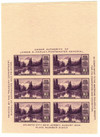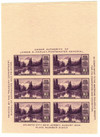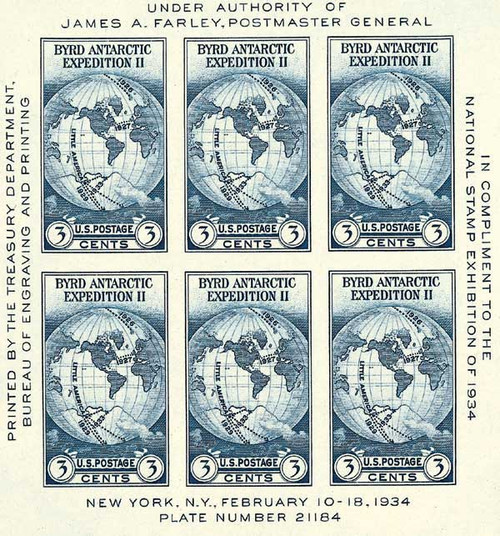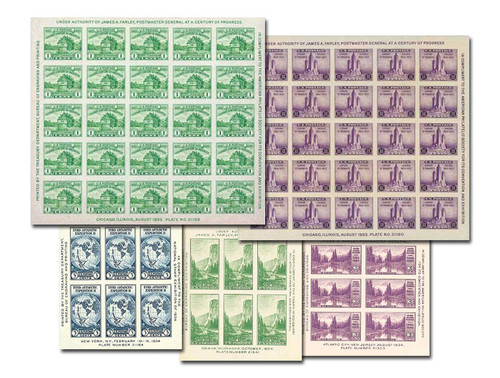
# 770 - 1935 3c National Parks: Mt. Rainier, Washington, souvenir sheet
U.S. #770
1935 3¢ Mt. Rainier
Issue Date: March 15, 1935
First City: Washington, DC
Quantity Issued: 215,920
The Special printing is identical to the 1934 Mt. Rainier souvenir sheet issued in conjunction with the American Philatelic Society Convention and Exhibition held in Atlantic City that year. Stamp pictures Mt. Rainier, the tallest mountain in Washington and the main attraction of a National Park named for it.
What are Farley’s Follies?
Farley’s Follies is one of stamp collecting’s most interesting stories. And since most of the stamps are readily available and inexpensive, it’s easy enough to put a specialized collection together. Let’s step back in time and discover one of the Postal Service’s biggest scandals…
James A. Farley (1888-1976) got his start in politics in 1911 as town clerk of Grassy Point, New York. He moved his way through the political system, forming the Upstate New York Democratic Organization and bringing many upstate voters to the Democratic party. In 1924, he met young Franklin Roosevelt at the Democratic National Convention. Four years later, FDR asked Farley to run his campaign for New York governor. Farley helped FDR win the elections for governor in 1928 and 1930. A driving force in the US political system, Farley helped FDR win the 1932 and 1936 presidential elections. Roosevelt made Farley his Postmaster General. Farley was pivotal in turning around the US Post Office Department. He helped the department finally turn a profit and revolutionized airmail service.
The infamous “Farley’s Follies” controversy began in 1933 when Farley removed several stamp sheets from the printing presses before they were gummed or perforated. He autographed these sheets (which were not available to the public) and gave them to colleagues and family, creating precious philatelic rarities. Stamp collectors were outraged when they discovered what had happened. Finally, the Post Office came up with a solution – the reissue in sheet form of all the stamps issued since March 4, 1933, in ungummed condition, all but the first two imperforate and in sufficient numbers to satisfy public demand. Although Farley and FDR had a falling out over Roosevelt’s plan to run for a third term, Farley remained a strong force in the political and business worlds. He went on to serve as Chairman of the Board of the Coca-Cola Export Corporation and served as a trusted advisor to several Popes, dignitaries, and Presidents until his death in 1976.
Farley’s Follies are Scarce and Valuable Collectibles
The British stamp firm Gibbons reportedly declared the reprint was “nauseous prostitution,” and at first refused to list the issues in their famous stamp catalog! But even today, over 80 years after they were issued, collectors still love Farley’s Follies.
“Farley’s Follies” were issued in large sheets that are way too big to fit in stamp albums. So smart collectors snapped up blocks and pairs in a variety of formats instead. They not only fit, but these key formats are an easy way to understand the stamp printing process.
Mystic purchased full sheets of these mint stamps and made them available in scarce formats like vertical, horizontal and gutter pairs plus arrow blocks, line pairs and cross gutter blocks. All are hard to find – some occur only once in every stamp sheet. It’s a neat way to own a scandalous slice of US postal history.
**NOTE: In 1940, the Post Office Department offered to (and did) gum full sheets of US #756-765 and #769-770 sent in by owners. No other specialty printings were accepted for gumming.**
U.S. #770
1935 3¢ Mt. Rainier
Issue Date: March 15, 1935
First City: Washington, DC
Quantity Issued: 215,920
The Special printing is identical to the 1934 Mt. Rainier souvenir sheet issued in conjunction with the American Philatelic Society Convention and Exhibition held in Atlantic City that year. Stamp pictures Mt. Rainier, the tallest mountain in Washington and the main attraction of a National Park named for it.
What are Farley’s Follies?
Farley’s Follies is one of stamp collecting’s most interesting stories. And since most of the stamps are readily available and inexpensive, it’s easy enough to put a specialized collection together. Let’s step back in time and discover one of the Postal Service’s biggest scandals…
James A. Farley (1888-1976) got his start in politics in 1911 as town clerk of Grassy Point, New York. He moved his way through the political system, forming the Upstate New York Democratic Organization and bringing many upstate voters to the Democratic party. In 1924, he met young Franklin Roosevelt at the Democratic National Convention. Four years later, FDR asked Farley to run his campaign for New York governor. Farley helped FDR win the elections for governor in 1928 and 1930. A driving force in the US political system, Farley helped FDR win the 1932 and 1936 presidential elections. Roosevelt made Farley his Postmaster General. Farley was pivotal in turning around the US Post Office Department. He helped the department finally turn a profit and revolutionized airmail service.
The infamous “Farley’s Follies” controversy began in 1933 when Farley removed several stamp sheets from the printing presses before they were gummed or perforated. He autographed these sheets (which were not available to the public) and gave them to colleagues and family, creating precious philatelic rarities. Stamp collectors were outraged when they discovered what had happened. Finally, the Post Office came up with a solution – the reissue in sheet form of all the stamps issued since March 4, 1933, in ungummed condition, all but the first two imperforate and in sufficient numbers to satisfy public demand. Although Farley and FDR had a falling out over Roosevelt’s plan to run for a third term, Farley remained a strong force in the political and business worlds. He went on to serve as Chairman of the Board of the Coca-Cola Export Corporation and served as a trusted advisor to several Popes, dignitaries, and Presidents until his death in 1976.
Farley’s Follies are Scarce and Valuable Collectibles
The British stamp firm Gibbons reportedly declared the reprint was “nauseous prostitution,” and at first refused to list the issues in their famous stamp catalog! But even today, over 80 years after they were issued, collectors still love Farley’s Follies.
“Farley’s Follies” were issued in large sheets that are way too big to fit in stamp albums. So smart collectors snapped up blocks and pairs in a variety of formats instead. They not only fit, but these key formats are an easy way to understand the stamp printing process.
Mystic purchased full sheets of these mint stamps and made them available in scarce formats like vertical, horizontal and gutter pairs plus arrow blocks, line pairs and cross gutter blocks. All are hard to find – some occur only once in every stamp sheet. It’s a neat way to own a scandalous slice of US postal history.
**NOTE: In 1940, the Post Office Department offered to (and did) gum full sheets of US #756-765 and #769-770 sent in by owners. No other specialty printings were accepted for gumming.**















